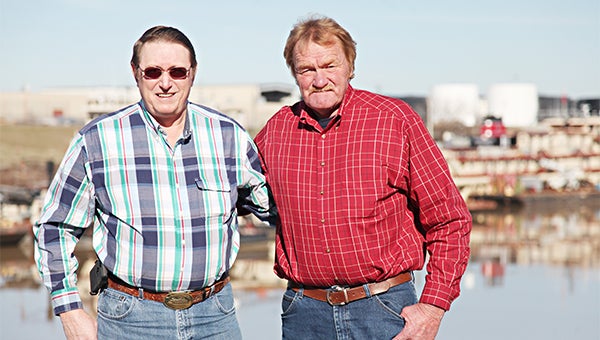Brothers sink final mats with the Corps
Published 12:33 am Sunday, January 11, 2015

80 YEARS: Billy and Bobby Stokes recently retired from the River Operations Branch of the Operations Division with a combined total of 80 years of service.
After four decades on the water, Billy Stokes plans just one more journey on a ship — only this time, it’s something a bit larger than the plant boat in the Mat Sinking Unit.
“I’ll be going on a cruise to Cozumel, with my wife, Carolyn, and daughters, some of their family,” he said. “It’ll be our first cruise.”
His brother, Bobby Stokes, sees simpler pursuits after about as long a resume with the unit.
“I have a bulldozer,” he said. “And one of my main hobbies is running heavy equipment. I’m fixin’ to do some side work using the skills I learned out there — at my pace.”
With hearty laughs, the sibling mat sinkers and grandfathers of 13 feign concern over the thought of Bobby working a dozer and Billy basking on a cruise ship.
“Yeah, there’s something messed up with that picture!” Bobby Stokes said.
The Stokes’ retired from the U.S Army Corps of Engineers this past month after spending most of their adult lives on the Corps’ unique revetment unit. Billy, 61, a revetment operations assistant, put in more than 42 years while Bobby, 59, retired as a manager in the river operations branch, worked there more than 38 years. The unit spends three to four months a year placing concrete squares along the banks of the Mississippi River to head off erosion.
They grew up in the Chickasaw community and attended Redwood School, then started their careers in the Corps at a time when jobs straight out of high school were easier to come by.
“Our neighbor, Edmund Price, recommended my brother for a job on the sinking unit in 1972,” Bobby Stokes said. “He went to work right out of Warren Central High School in 1972. Then he and the same man recommended me for a job. That’s the way it started, and I started in 1974.”
Bobby stayed on his tools, so to speak, for nearly four decades. From diesel mechanic, he became a construction foreman, then a facility manager specialist. Billy started as a winchman and rose through the ranks of various jobs including deck equipment operator and boat foreman. Both played the role of teacher in later years, even as titles didn’t always align with age.
“Most of our supervisors were younger than us, by the midway point of our career,” Billy said. “When we first went out there, it was older guys running the unit. Then it kind of swapped over. Some of them became our chief.”
“It’s probably one of the most hazardous work areas in the Corps. You’ve got moving cables and moving equipment. If you make one wrong move, you could get hurt or lose a finger.”
Each turned rescuer on Aug. 16, 1990, for their most harrowing moment on the unit, when an 800-foot oil tanker lost steering and struck one of the unit’s quarter boats that was tied to a barge near Venice, La., south of New Orleans. About 50 on board the housing vessel were reported injured in the crash. That incident led to stronger support staff of contact pilots who monitor river traffic for the unit.
“It hit right after midnight,” Bobby Stokes said. “I was up on the plant boat working night shift. We were helping get the people off the quarter boat before it went down.”
“We had just done a renovation on it,” Billy Stokes said of the housing vessel. “It sank in 20 minutes. I was in bed, on another quarter boat.”
Neither sibling was among the 38 hospitalized after the incident.
Diversions for the MSU’s crew of about 300 were plentiful once men took a pit stop in various cities and towns where they could disembark the plant boat or quarter boat for any length of time.
“You eat with ’em, you rode to work with ’em, and you had some of them in your room with you,” Bobby Stokes said. “Three or four months a year, you were with ’em just about 24 hours a day.”
“It’s like a small city,” Billy said. “It became kind of like a family, because you spend more time there than you do at home.”
For the Stokes, that’s a relative term — because they’re neighbors at home, too. Since the early 1980s, they’ve lived beside one another in Timberlane subdivision, in south Warren County. And these neighbors don’t need good fences because life is simply all in the family.
“You walk outside, and you’re right there,” said Cathy Stokes, Bobby’s wife. “It was Bobby talking to Billy or one of the kids talking to them.”
In the days before cellphones, reaching a loved one on the mat sinking unit took a certain amount of patience, Cathy said.
“He would work 12 days on, two days off,” she said. “And the only time he could call was whenever they could get off the boat and call from a pay phone.”
“We’d put a vehicle up on a hill, build a roadway in,” Bobby Stokes said. “If you’d want to go to town every night, you’d go. Lots of times, we’d get up on a hill and cook sausage or hot dogs.”
When it came to leisure on board the boats, Bobby and Billy played hands of cards and dominoes with the best of them. Bobby was better, Billy will say.
“There’s four of us brothers altogether and we’ve always been close,” Billy Stokes said. “Our lifestyles are different, but we’re still close.”





